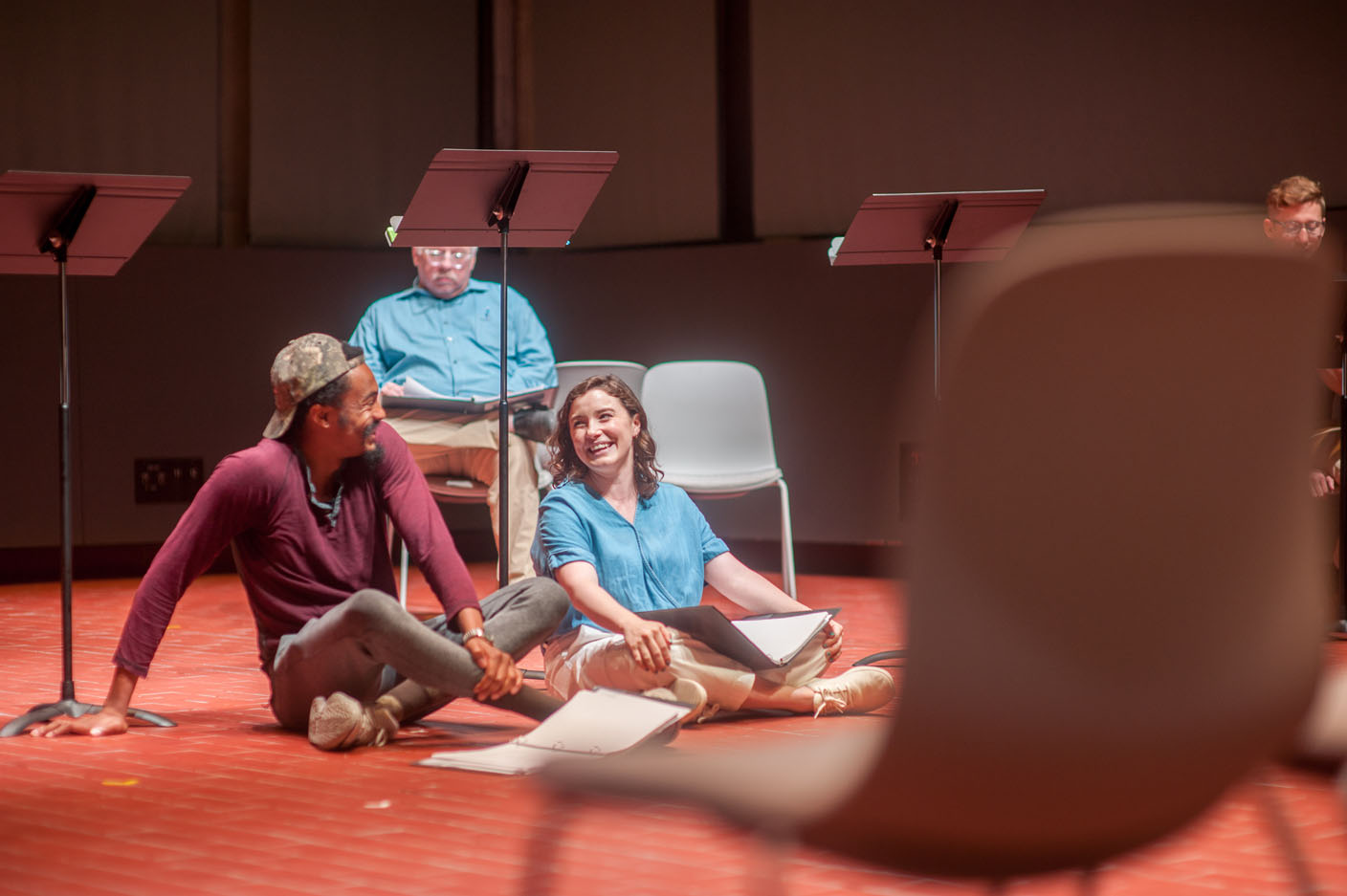What if you, as a fan of theater, had a chance to see in to the future?
“In the last several seasons in particular, many of the plays featured at the Arkansas New Play Festival have gone on to major productions and award recognition,” says Dexter J. Singleton, director of New Play Development for TheatreSquared.
Now in its 15th year, the Arkansas New Play Festival has helped jump start more than 75 new plays, he points out, among them “At the Wedding” by Bryna Turner, which opened at the Lincoln Center in the spring of 2022; “Weightless” by the Kilbanes, which was nominated for a Lucille Lortel and Drama Desk Award in its WP Theatre debut this season; “Russian Troll Farm” by Sarah Gancher, a New York Times Critic’s Pick that received a 2022 Obie Award; and, most recently, “FLEX” by Candrice Jones, opening at the Lincoln Center this summer.
This year’s festival offers “a diverse lineup of powerful, new, thought-provoking plays by a mix of established, well-known writers as well as emerging writers and those newer to the field,” Singleton notes. “You can always say that you saw it at ANPF first.”
Scheduled to be performed at locations in both Benton and Washington counties starting today and continuing through July 25 are:
“Nancy” by Rhiana Yazzie, directed by Ken-Matt Martin.
It’s 1985 in Washington, D.C., and two women are trying to steer their futures — Nancy Reagan from the White House, orchestrating her husband “Ronnie’s” political career according to daily astrological trends, and Esmeralda, a Navajo mother advocating for her community.
“The Grove of Forgetting” by Robert Ford, directed by Damon Kiely.
Summer, 1938. Ilona, a famed concert pianist, refuses to be ruled by fear even as fellow Jewish artists and academics flee Hungary. Budapest is a haven from the growing Nazi fervor — isn’t it? Filled with intrigue, music, and wry humor, “The Grove of Forgetting” is a taut emotional thriller.
“Raices|Roots” by LatinX Theatre Project.
The newest devised work by the LatinX Theatre Project. LXTP is a socially engaged theater group of professionals and young artists-in-training that is committed to continuing an inclusive conversation about community identity through its devised theater performances.
“Saturday Mourning Cartoons” by Iraisa Ann Reilly.
Jessica and Benny, two Latino siblings, have a falling out over whether to put their abuela, Yolanda, in a nursing home. Ultimately, Benny wins the argument. But when they are no longer able to go inside the home during visiting hours, the family is forced to confront one another while visiting her at the window.
“I Am Delivered’t” by Jonathan Norton.
Good Friday. The New Jerusalem Missionary Baptist Church’s Seven Last Words service is in full swing. But outside — on the church parking lot — another resurrection story is taking shape. Sis, the vice president of Usher Board No. 1, and her protege Pickles find themselves in a battle royal of romantic quagmires.
Performances will be held in Bentonville at the Momentary (507 S.E. E St.), in Springdale at the Medium (214 S. Main St.), and in Fayetteville at TheatreSquared (477 W. Spring St.). New Play Passes, with access to all Northwest Arkansas performances, are on sale now for $50 at 777-7477 or arkansasnewplayfest.com.
FYI
Meet The Playwrights
Jonathan Norton is the author of “I Am Delivered’t,” and Iraisa Ann Reilly is the author of “Saturday Mourning Cartoons.” Here are some of their thoughts from an email Q&A:
JN: “I Am Delivered’t” is a rom-com featuring church ushers that takes place in the parking lot of a black Baptist church. I’ve also wanted to write a play that celebrates the Black church experience in all of its the richness and complexity.
IAR: “Saturday Mourning Cartoons” is a play about dealing with change when everything changes at once, and mourning alone in a time of collective mourning. As far as the origins — spoiler — the pandemic happens during the course of the play. But I didn’t want this play to feel like a “pandemic play.” I wanted it to be about a family living through a difficult time and finding a way to connect.
JN: I have two big goals (at ANPF). The first is to examine and strengthen characters’ arcs and objectives. The second is to examine the fifth character in the play — the unseen church congregation — and understand how they function in the play.
IAR: Play development workshops are a necessary part of the process and are invaluable for a playwright. It gives you the freedom and opportunity to try new things, get feedback, and try different puzzle pieces until you get to the heart of the story you are trying to tell. It’s also helpful to hear the play in front of different audiences.
JN: Having two readings spread apart is such a gift because it gives me more opportunity to listen and revise. Listen to the play. Listen to the audience and then move accordingly. And I listen differently at the second reading, than I do at the first. The first reading takes some of the pressure off of the second, and I can relax and really hear new things.
IAR: I’m excited to hear how folks in Arkansas react to this story. It’s a very specific family and culture, but I like to think the themes and struggles they go through are universal.
 Jonathan Norton
Jonathan Norton Iraisa Ann Reilly
Iraisa Ann Reilly “Our goal is always to find a diverse set of plays and playwrights that cover a range of topics and genres,” says Dexter J. Singleton, director of New Play Development for TheatreSquared. “We want each years festival to have a little bit for everybody just like when we choose our season. This years lineup of plays covers that well.” (Courtesy Photo/T2)
“Our goal is always to find a diverse set of plays and playwrights that cover a range of topics and genres,” says Dexter J. Singleton, director of New Play Development for TheatreSquared. “We want each years festival to have a little bit for everybody just like when we choose our season. This years lineup of plays covers that well.” (Courtesy Photo/T2)FYI
Meet The Playwrights
Jonathan Norton is the author of “I Am Deliveredt,” and Iraisa Ann Reilly is the author of “Saturday Mourning Cartoons.” Here are some of their thoughts from an email Q&A:
JN: “I Am Deliveredt” is a rom-com featuring church ushers that takes place in the parking lot of a black Baptist church. Ive also wanted to write a play that celebrates the Black church experience in all of its the richness and complexity.
IAR: “Saturday Mourning Cartoons” is a play about dealing with change when everything changes at once, and mourning alone in a time of collective mourning. As far as the origins — spoiler — the pandemic happens during the course of the play. But I didnt want this play to feel like a “pandemic play.” I wanted it to be about a family living through a difficult time and finding a way to connect.
JN: I have two big goals (at ANPF). The first is to examine and strengthen characters arcs and objectives. The second is to examine the fifth character in the play — the unseen church congregation — and understand how they function in the play.
IAR: Play development workshops are a necessary part of the process and are invaluable for a playwright. It gives you the freedom and opportunity to try new things, get feedback, and try different puzzle pieces until you get to the heart of the story you are trying to tell. Its also helpful to hear the play in front of different audiences.
JN: Having two readings spread apart is such a gift because it gives me more opportunity to listen and revise. Listen to the play. Listen to the audience and then move accordingly. And I listen differently at the second reading, than I do at the first. The first reading takes some of the pressure off of the second, and I can relax and really hear new things.
IAR: Im excited to hear how folks in Arkansas react to this story. Its a very specific family and culture, but I like to think the themes and struggles they go through are universal.
